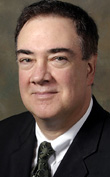HPV Vaccine for Men?
The new vaccine used to prevent sexually transmitted human papillomavirus (HPV) in women and girls could play the same role in men and boys, says UCSF Professor of Medicine Joel Palefsky, MD. Without vaccination, Palefsky adds, "about 75 percent of men and women are going to get an HPV genital infection at some point."
In females, the vaccine, called Gardasil, prevents infection by two HPV strains that are responsible for 70 percent of cervical cancers. The vaccine also prevents infection by two strains that cause 90 percent of genital warts.
In 2006, Gardasil was licensed for use in girls as young as 9. The US Centers for Disease Control and Prevention recommends vaccination for girls starting at age 11 and for women up to the age of 26.
Merck, the maker of the vaccine, now is conducting a worldwide clinical trial in men and boys ages 16 to 26 with few or no lifetime sexual partners. Most have never been infected. As part of this trial, Palefsky will be studying a subset of males - young men who have had sex, or who expect to have sex, with other men.
Culprit in Cervical, Anal, Oral, Penile Cancers
In men and boys, the vaccine is expected to prevent common penile warts and about half of penile cancers, a rare disease. In addition, the vaccine is expected to prevent oral cancers due to HPV infection, the incidence of which is increasing, especially among men.
HPV infection also is the primary cause of anal cancer. In the United States, anal cancer incidence is increasing among both women and men. HPV infection rates are especially high among HIV-positive men and women, Palefsky notes, and the highest rates of HPV-associated cancers occur among men who have sex with men.
Earlier studies showed that boys and girls mount similar immune responses to Gardasil. But the new phase III clinical trial is the true test of whether the vaccine prevents HPV infection in males. Even so, male vaccination already is approved in some other countries.
"If the vaccine is effective in males, then for men who have sex with men, it will be beneficial," Palefsky says.
Cost Versus Benefit Is an Open Question
For other males, lowering risks for rare or minor diseases through vaccination may or may not be worth the cost, Palefsky says. Despite its lifesaving potential, some say Gardasil has not been studied long enough to know much about side effects. Its high price also is an issue - about $360 for three doses - as is its failure to protect against all disease-causing HPV strains.
Another consideration is that if not all girls get the three recommended doses, then vaccination of boys could help increase collective "herd immunity," further lowering HPV transmission and, ultimately, cervical cancer incidence.
"These are good things, but we would still need to look closely at the costs and benefits of vaccination," Palefsky says.
If there is no recommendation that all boys be vaccinated, then those most at risk may lose out, Palefsky says. "There are likely to be many young people who have identified themselves as gay, but who have not acted on it yet. They are unlikely to go to a school nurse, say they are at risk and ask to be vaccinated."
 |
Joel Palefsky |